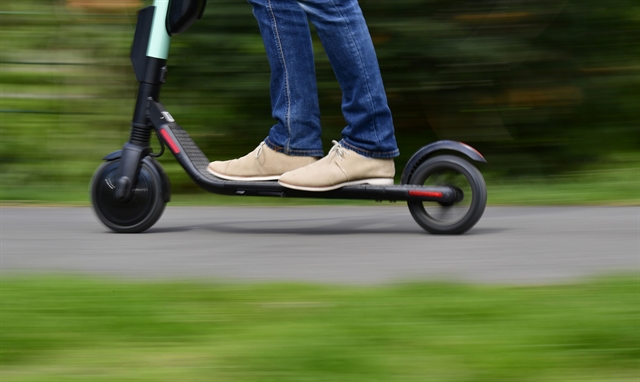
A Bird e-scooter, like those available for short-term rent in Redditch, UK. E-scooters have great potential to provide convenient, affordable and climate-friendly transport across Việt Nam in the future. AFP/VNA Photo
Seán Nolan
Climate change is driving decision-making across much of society, and transportation is no exception. However, combining ease of use, practicality and affordability with net-zero emission targets is often easier said than done.
I’m lucky enough to be visiting the UK for the first time since before the pandemic and lurking among a host of reverse culture shocks are new developments and changes from the past few years.
I grew up in a place called Redditch, a ‘new town’ built in the 1960s as a commuter dwelling for the second city of Birmingham.
Dotted along the familiar streets and cul-de-sacs of my younger years are some rather high-tech looking scooters, seemingly abandoned, here, there and everywhere.
At first I thought they belonged to teenagers foolishly hoping they wouldn’t be robbed, but they are actually part of a pilot initiative by the Department for Transport and Bird Co., an electric scooter manufacturer from the US.
These e-scooters are available to rent for 0.15GBP (VNĐ4,000) a minute, offering a green, sustainable and much more convenient public transport method than the bus routes of before.
While the Bird initiative is being piloted in Redditch, they are far from the only company in the UK offering these services.
On my last day in London, strikes on both the tube and buses meant I had to find a way from Oval to Marylebone station for my train, a distance of about six miles.
Despite the Transport for London strike, there was an array of e-scooter options available.
A quick search on an app called CityMapper showed the nearest e-scooters from an array of competing companies, alongside relevant information such as prices and remaining battery charge left.
Hitting the open road was as easy as scanning a QR code.
Coming a little closer to home, Hà Nội’s public transport system is expansive, with affordable bus routes and a soon-to-be-expanded metro system.
However, a big factor holding the metro back at the moment is the lack of connectivity to and from the existing line, meaning ride-hail services or personal transport must be used too.
Now, if a fleet of e-scooters were available across the city, including at metro stations, then perhaps the new line would be a lot more appealing and convenient.
As well as promoting existing and future public transport systems, reliance on fossil fuel-powered vehicles would be reduced, while reliability and accessibility would be supplemented with the latest technology.
Finding green, sustainable transportation solutions isn’t easy - it will require a little bit of thinking outside the box, and maybe borrowing a few ideas too. VNS
OVietnam